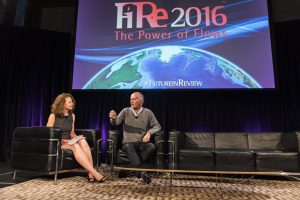Putting the Slave Trade Out of Business
By Nick Fritz
The slave trade is alive and well. Although invisible to most, millions of people are affected each year by human trafficking. Andrew Wallis, Founder and CEO of Unseen UK, and moderator Cynthia Figg met to discuss the efforts being undertaken in the UK to eliminate modern slavery.
Modern slavery is an illicit trade, subject to the economic principles of supply and demand. Globally, this business annually creates $150B in profit, exploiting more than 46 million people globally. Most of the people are migratory women and children who are fleeing war, famine or seeking economic fulfillment.
However, recently there has been a shift in the female to male ratio. More and more men are becoming victims of the slave network, driven by a global need for labor. This forced labor exists at the bottom of many supply chains, which are often so long and convoluted that the parent organizations have little idea of the injustice occurring.
“Supply chain is the wrong term,” Wallis said. “We should be calling them supply whips.”
In this way, the average consumer interacts with slavery on a regular basis. Many of the products bought and sold all around the world, especially cotton, electronics, and food, have a high likelihood of slavery in the supply chain.
The key to reversing this trend and putting slavers out of business is for commercial enterprise to get involved. Increasingly, firms are paying very close attention to their supply chains and in some cases are required by law to demonstrate supply chain transparency. In the UK, firms whose sales exceed £35M annually are required to submit a supply chain transparency report detailing efforts to eliminate social injustice to the lowest links of the chain.
The millennial generation is accelerating this change by rewarding socially responsible firms with their business and thereby incentivizing companies to undertake these efforts.
Additionally, a human trafficking help line is now live in the UK. The helpline can be used by anybody experiencing, witnessing or concerned about human trafficking incidents. The goal for the helpline is to eventually have one number recognized globally as the human trafficking hotline. In this way individuals are empowered to help end modern slavery.
Finally, big data applications are just now coming online to fight this problem. Law enforcement agencies, businesses and the hotline are all streaming large amounts of data to Unseen UK for analysis. Predictive analytics will begin to be useful in identifying individuals, companies and trade routes that are hot spots for violations.
Andrew Wallis believes in the efficacy of these efforts, and is hopeful for the future. “Our mission is to put slavery out of business. I think we can do that in a generation.”
To discover more or read other articles from the conference, visit StratNews.com or our Medium blog.
